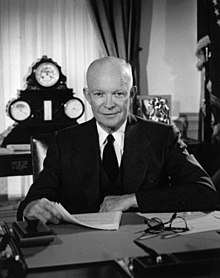工業複合體
| 經濟學 |
|---|
 |
|
|
工業綜合體(英語:Industrial complex)是一個社會經濟概念,其中企業與社會或政治系統或機構交織在一起,從這些系統中創造或支持利潤經濟。使用該詞時一般是強調這樣一個複合體過於追求自己的經濟利益,而不顧並且經常以犧牲社會其他工業領域和個人的最大利益為代價。
工業複合體內的企業一開始可能是為了推進一個良好的社會或政治目標而創建的,但在未達到目標時,它們已經獲得過多利益。工業複合體可能會從維護對社會有害或效率低下的系統中獲利。[註 1]
歷史[編輯]

美國總統德懷特·艾森豪威爾[1] 在 1961 年 1 月 17 日的告別演說中推廣了這一概念。 艾森豪威爾描述了一種「對民主政府的威脅」[1],稱為軍工複合體。 由於美國軍火工業的盈利能力以及受僱於軍事服務、軍火工業和軍火工業各個部門的公民人數,這一複合體涉及軍事機構對美國社會的經濟、政治和精神領域的「不正當影響」。 向美國軍隊提供商品的其他企業。 「複合體」源於為軍事目標服務的多邊經濟的創建,以及源於多邊主義目標(持續利潤)與軍事理論目標(和平)對立的悖論。
操作[編輯]
在許多情況下,工業複合體指的是一個機構聲稱的社會政治目的與企業和政府機構的經濟利益之間的利益衝突,企業和政府機構從追求這種目的中獲利,而實現既定目的將導致這些企業的經濟損失。。 例如,美國刑罰制度的本意是幫助罪犯成為守法公民[2],但監獄-工業複合體依靠大量囚犯生存,因此依靠刑罰制度未能實現其罪犯改造和重新進入社會的目標。 在這些類型的案例中,政府機構通常被認為從制度工業化中獲利,這可能會削弱他們以可能對社會有益的方式對此類制度進行立法的動機。
工業複合體概念也被非正式地用來表示人為創造、膨脹、或操縱機構的社會價值,以增加盈利機會,特別是通過專業業務和利基產品。 這方面的一個例子是婚姻-工業複合體[3][4][5][6], 創造了對婚紗製造商、婚禮場地、婚禮策劃師、婚禮蛋糕烘焙師、婚禮租賃公司、婚禮攝影師等的需求[7]。
例子[編輯]
- 學術-工業複合體[8][9][10][11]
- 軍事-工業複合體 — 為軍隊提供武器、軍服的企業,從戰爭中持續獲利,但停戰與和平則會造成虧損。[12]
- 軍事-娛樂業複合體
- 軍事-工業-媒體複合體[13]
- 動物-工業複合體 — 對非人類動物的系統化和制度化剝削,這需要在後來被稱為「動物大屠殺」的數十億動物中繁殖和屠殺,[14][15]:29–32, 97[16] 威脅人類生存[17]:299 並導致氣候變化等環境破壞[18], 海洋酸化[18], 生物多樣性喪失[18], 人畜共患疾病傳播[19]:198[20][21],和第六次生物大滅絕[22]
- 運動-工業複合體
- 嬰兒或尿布-工業複合體[23][24][25]
- 醫藥-工業複合體 — 醫院和製藥公司希望更多患者生病和服藥,從瘟疫中持續獲利,但人民健康則會造成虧損。
- 監獄-工業複合體 — 企業從囚犯那裏獲得比平民更加便宜的勞動力資源,從強制囚犯免費勞動持續獲利,但監獄在低入住率時會造成虧損。
- 婚禮/婚姻-工業複合體 — 與婚禮相關的企業和供應商從婚禮的日益奢侈和成本中獲利,並將受到規模較小、成本較低的活動或私奔的負面影響,因此他們會繼續承受昂貴婚禮的壓力[26]。
- 政治-媒體複合體
參閱[編輯]
註釋[編輯]
參考資料[編輯]
- ^ 1.0 1.1 Ike's Warning Of Military Expansion, 50 Years Later. NPR.org. [2019-07-03]. (原始內容存檔於2020-03-29) (英語).
- ^ Organization, Mission and Functions Manual: Federal Bureau of Prisons. www.justice.gov. 2014-08-27 [2019-07-03]. (原始內容存檔於2019-05-25) (英語).
- ^ What the Wedding Industrial Complex Is – And How It's Hurting Our Ideas of Love. Everyday Feminism. 2017-04-13 [2019-07-04]. (原始內容存檔於2023-06-09) (美國英語).
- ^ The wedding industrial complex. theweek.com. 2013-06-15 [2019-07-04]. (原始內容存檔於2023-06-05).
- ^ Escobar, Natalie. The Wedding-Industry Bonanza, on Full Display. The Atlantic. 2019-02-11 [2019-07-04]. (原始內容存檔於2023-06-09) (美國英語).
- ^ Garber, Megan. How 'I Do' Became Performance Art. The Atlantic. 2017-07-20 [2019-07-04]. (原始內容存檔於2023-07-18) (美國英語).
- ^ The Dark Side Of The Disney Princess Fantasy. HuffPost. 2012-06-29 [2019-07-04]. (原始內容存檔於2023-06-09).
- ^ Nocella II, Anthony J.; Best, Steven; McLaren, Peter (編). Academic Repression: Reflections from the Academic Industrial Complex. AK Press. 2010. ISBN 978-1904859987.
- ^ Lee, Felicia R. Academic Industrial Complex. The New York Times. 2003-09-06 [2019-07-04]. ISSN 0362-4331. (原始內容存檔於2019-07-04) (美國英語).
- ^ Gandio, Jason Del. "Neoliberalism and the Academic-Industrial Complex". Truthout. [2019-07-04]. (原始內容存檔於2019-08-24) (美國英語).
- ^ Smith, Andrea. Social-Justice Activism in the Academic Industrial Complex. Journal of Feminist Studies in Religion. October 2007, 23 (2): 140–145 [2023-06-09]. S2CID 144483113. (原始內容存檔於2019-07-04).
- ^ Ike's Warning Of Military Expansion, 50 Years Later". NPR.org. Retrieved 2019-07-03.
- ^ Miller, Toby. The Media-Military Industrial Complex. Steven Best; Richard Kahn; Anthony J. Nocella II; Peter McLaren (編). The Global Industrial Complex: Systems of Domination. Rowman & Littlefield. 2011: 97–115 [2023-06-05]. ISBN 978-0739136980. (原始內容存檔於2021-09-05).
- ^ Benatar, David. The Misanthropic Argument for Anti-natalism. S. Hannan; S. Brennan; R. Vernon (編). Permissible Progeny?: The Morality of Procreation and Parenting. Oxford University Press. 2015: 44. ISBN 978-0199378128.
- ^ Best, Steven. The Politics of Total Liberation: Revolution for the 21st Century. Palgrave Macmillan. 2014. ISBN 978-1137471116.
- ^ Hedges, Chris. A Haven From the Animal Holocaust. Truthdig. August 3, 2015 [August 29, 2021]. (原始內容存檔於2023-01-27).
- ^ Sorenson, John. Critical Animal Studies: Thinking the Unthinkable. Toronto, Ontario, Canada: Canadian Scholars' Press. 2014 [7 October 2018]. ISBN 978-1-55130-563-9.
- ^ 18.0 18.1 18.2 Steinfeld, Henning; Gerber, Pierre; Wassenaar, Tom; Castel, Vincent; Rosales, Mauricio; de Haan, Cees, Livestock's Long Shadow: Environmental Issues and Options (PDF), Rome: FAO, 2006 [2023-06-05], (原始內容存檔 (PDF)於2019-12-10)
- ^ Nibert, David. Origins and Consequences of the Animal Industrial Complex. Steven Best; Richard Kahn; Anthony J. Nocella II; Peter McLaren (編). The Global Industrial Complex: Systems of Domination. Rowman & Littlefield. 2011: 197–209 [2023-06-05]. ISBN 978-0739136980. (原始內容存檔於2021-09-05).
- ^ Beirne, Piers. Wildlife Trade and COVID-19: Towards a Criminology of Anthropogenic Pathogen Spillover. The British Journal of Criminology (Oxford University Press). May 2021, 61 (3): 607–626 [19 September 2021]. ISSN 1464-3529. PMC 7953978
 . doi:10.1093/bjc/azaa084. (原始內容存檔於2023-04-07).
. doi:10.1093/bjc/azaa084. (原始內容存檔於2023-04-07).
- ^ Adams, Carol J. "Mad Cow" Disease and the Animal Industrial Complex: An Ecofeminist Analysis. Organization & Environment (SAGE Publications). 1997, 10 (1): 26–51 [7 September 2021]. JSTOR 26161653. S2CID 73275679. doi:10.1177/0921810697101007. (原始內容存檔於2023-04-07).
- ^ Ripple WJ, Wolf C, Newsome TM, Galetti M, Alamgir M, Crist E, Mahmoud MI, Laurance WF. World Scientists' Warning to Humanity: A Second Notice (PDF). BioScience. 13 November 2017, 67 (12): 1026–1028 [23 October 2021]. doi:10.1093/biosci/bix125. hdl:11336/71342
 . (原始內容 (PDF)存檔於15 December 2019).
. (原始內容 (PDF)存檔於15 December 2019). Moreover, we have unleashed a mass extinction event, the sixth in roughly 540 million years, wherein many current life forms could be annihilated or at least committed to extinction by the end of this century.
- ^ 10 Essential Diaper Changing Tips For New Parents. HuffPost. 2018-01-25 [2019-07-03]. (原始內容存檔於2020-03-18).
- ^ Chopra, Samir. The Baby Industrial Complex. Samir Chopra. 2013-09-13 [2019-07-03]. (原始內容存檔於2019-07-03) (英語).
- ^ China Leads the Way in Diapers. Nonwovens Industry Magazine - News, Markets & Analysis for the Nonwovens Industry. [2019-07-03]. (原始內容存檔於2019-07-03).
- ^ The wedding industrial complex. theweek.com. 2013-06-15 [2020-11-02]. (原始內容存檔於2023-06-05) (英語).
